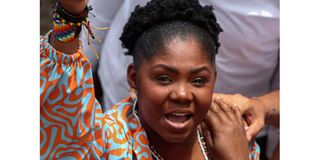Colombia’s first woman VP’s long walk to the top

Colombian presidential candidate Gustavo Petro's running mate Francia Marquez gestures after voting during the presidential runoff election in Suarez, Cauca department, Colombia, on June 19, 2022.
What you need to know:
- Márquez, an Afro-Colombian, was the most unlikely vice-presidential candidate in a deeply unequal country whose structural racism is designed to break the spirit of black folk.
- Her story is compelling not only because she is Colombia’s first black female vice-president, but also because of her poor background and the tough life she has led so far.
This week, Colombia held a historic presidential election that saw the South American country elect its first black female vice-president.
Francia Márquez, a black woman and a former house maid, is set to be one of the most powerful politicians in a country where black people are ‘treated as minor’.
Márquez, an Afro-Colombian, was the most unlikely vice-presidential candidate in a deeply unequal country whose structural racism is designed to break the spirit of black folk. Her story is compelling not only because she is Colombia’s first black female vice-president, but also because of her poor background and the tough life she has led so far.
Márquez’s improbable journey began 40 years ago in Cauca, Southwestern Colombia. Her mother was a midwife who gave birth to her alone because there was nobody else around to assist her.
She grew up poor and got pregnant at 16. She worked at a local mine to fend for her child and later worked as a house maid. She would eventually study law, putting her on the path to national leadership.
Her leadership journey started at the age of 13 when she became an activist after the government proposed the expansion of a dam that would divert a river in her village, hence threatening the livelihood of her people.
She would later lead women in her village in a 400-mile walk to protest against illegal minors invading her community. A few years later, she was awarded the prestigious Goldman Environment Prize, which is considered the environmental ‘nobel’ prize.
First leftist president
In March this year, she came third with more than 750,000 votes in a presidential primary. Leftist presidential frontrunner Gustavo Petro had no choice but to name her his running mate. Petro and Márquez won the presidential election this week, making Petro Colombia’s first leftist president.
Even in her victory, Márquez has been on the receiving end of critical opprobrium, including racist slurs such as “Go run a town in Africa” and dehumanising, racial comparisons to “King Kong”, a fictional monster character resembling a gorilla.
Others have questioned her legitimacy and pointed out her lack of experience in politics and doubted her capacity to understand economic policy and her ability to be commander-in-chief. Colombia, being one of the countries with the highest income inequalities in the world, Márquez’s poor family background has been a topic of obsession among the high-class society, who have a few choice words for a poor black girl who rose to become their first female black vice-president.
It would appear the experiences of the black female are eerily similar across the world – from Africa to Colombia and the US, it doesn’t matter how hard you work, there will always be somebody who thinks you are not good enough.
The good news is in spite of the racist abuse and second-guessing, Márquez and her party are determined to turn around the lives of Colombia’s marginalised population; rural and black. And that’s all that matters.
Dr Njoki Chege is the Director, Innovation Centre, at Aga Khan University;[email protected]





